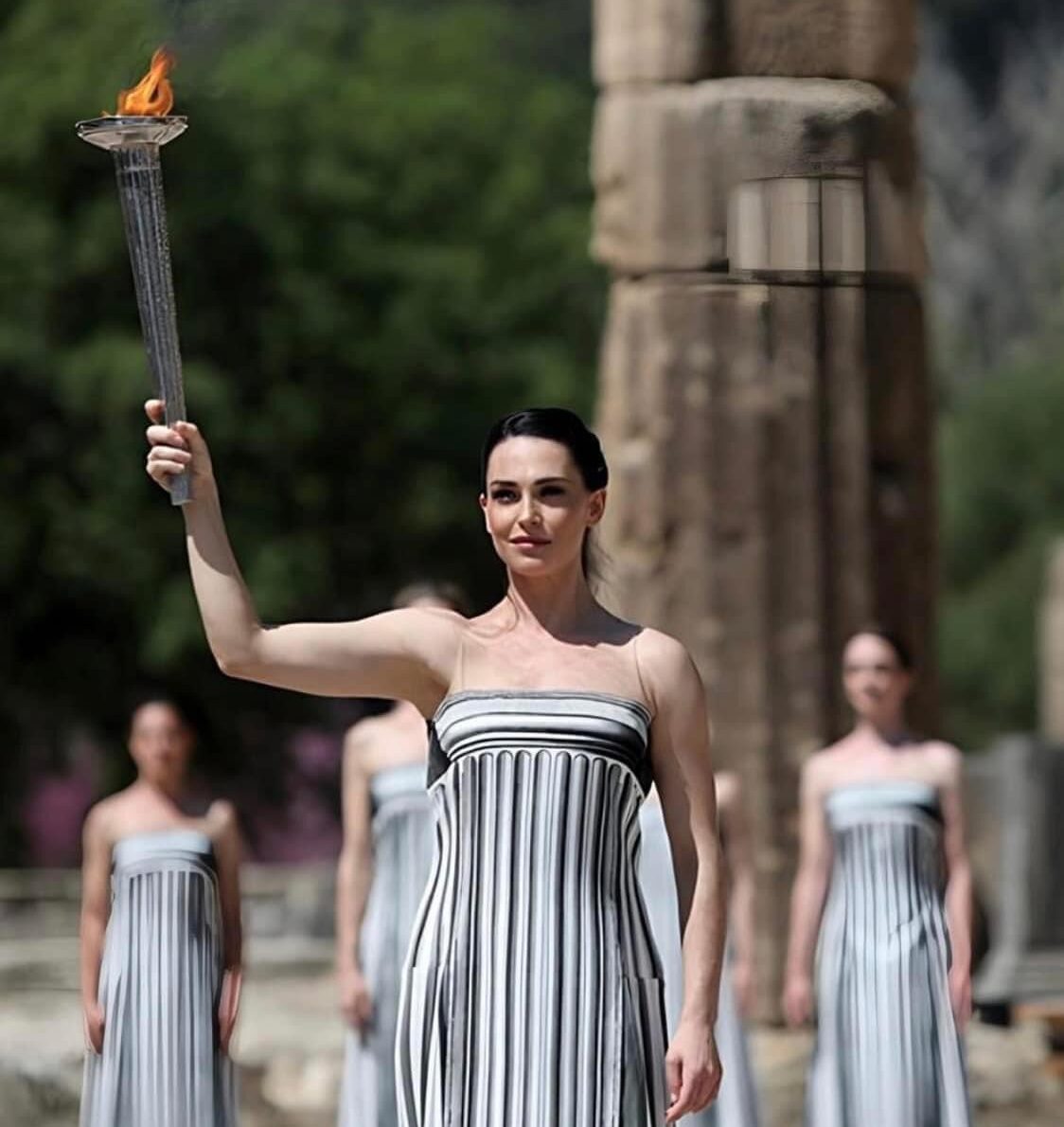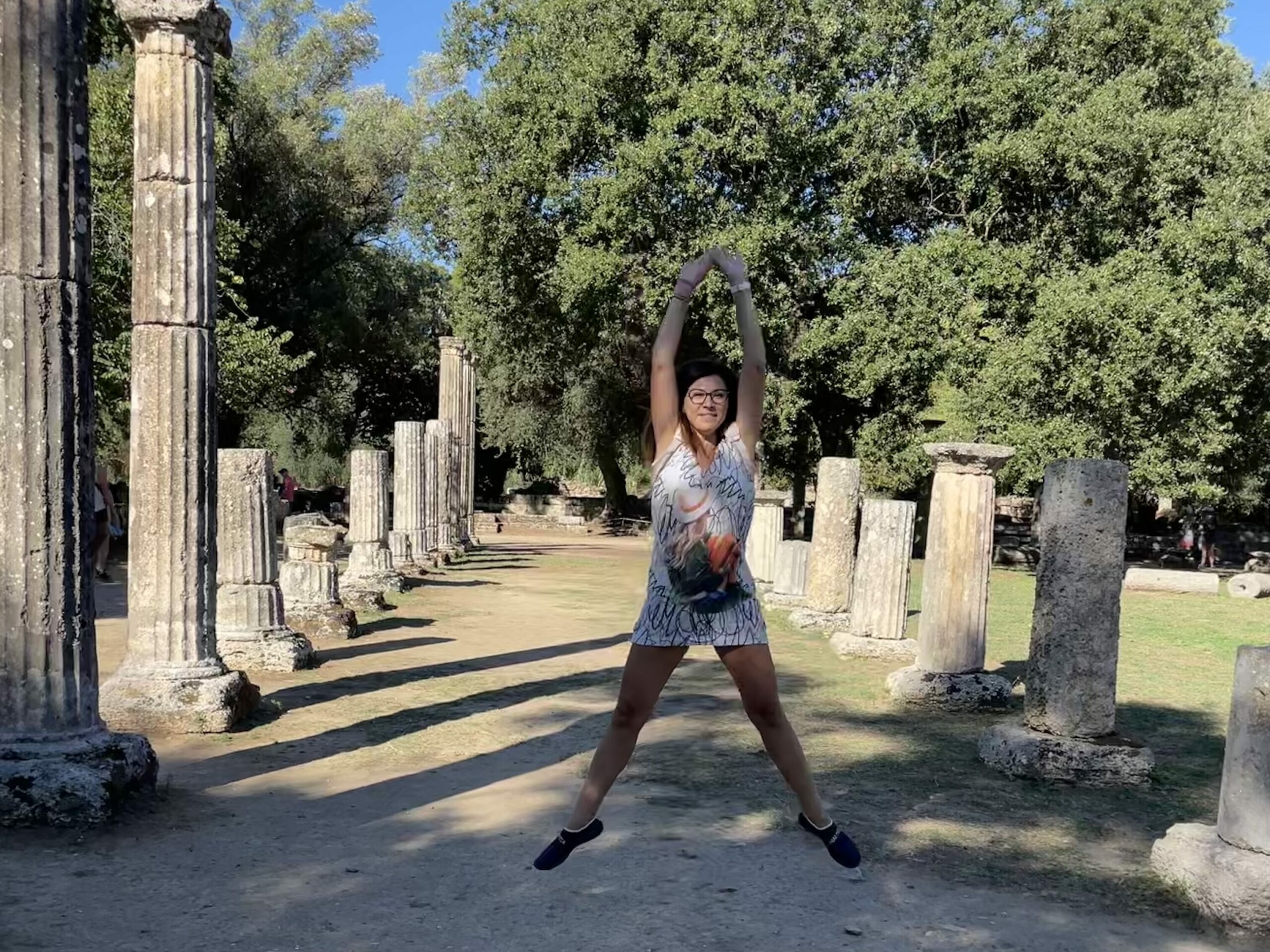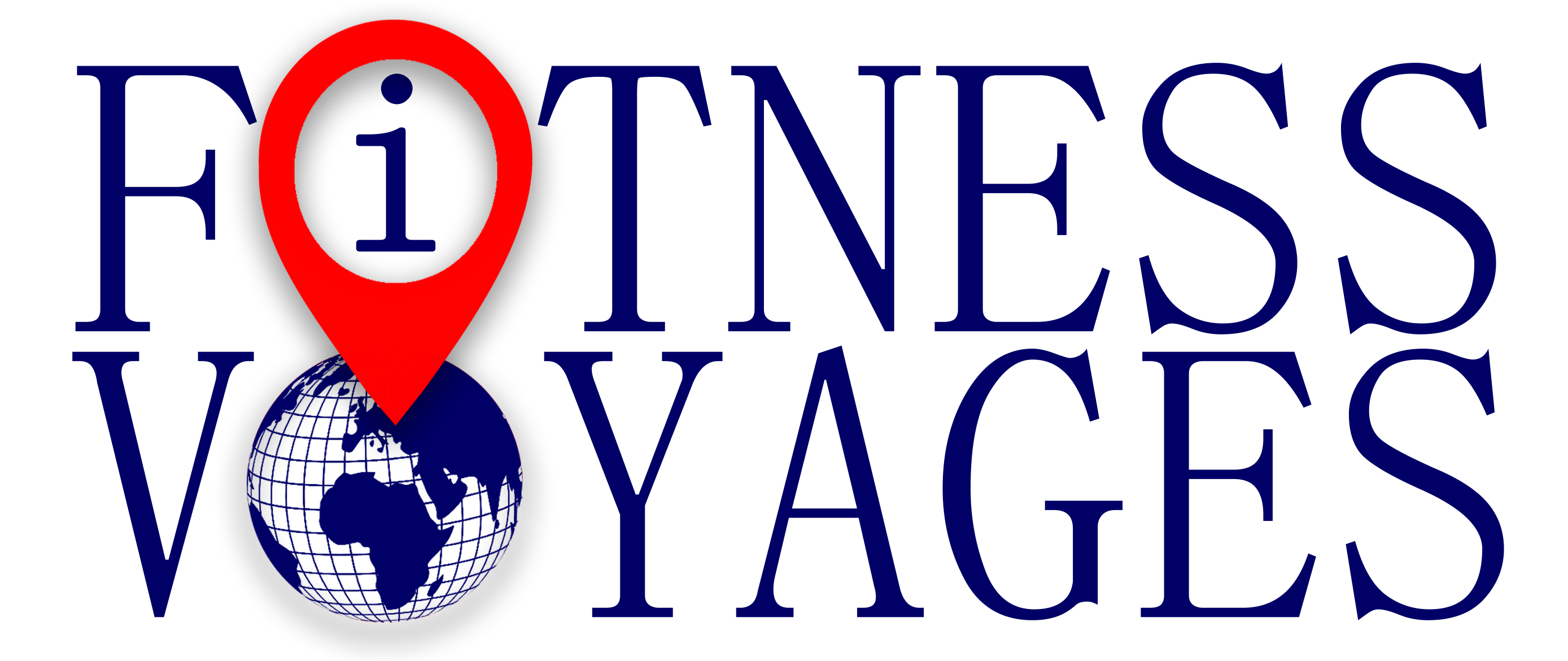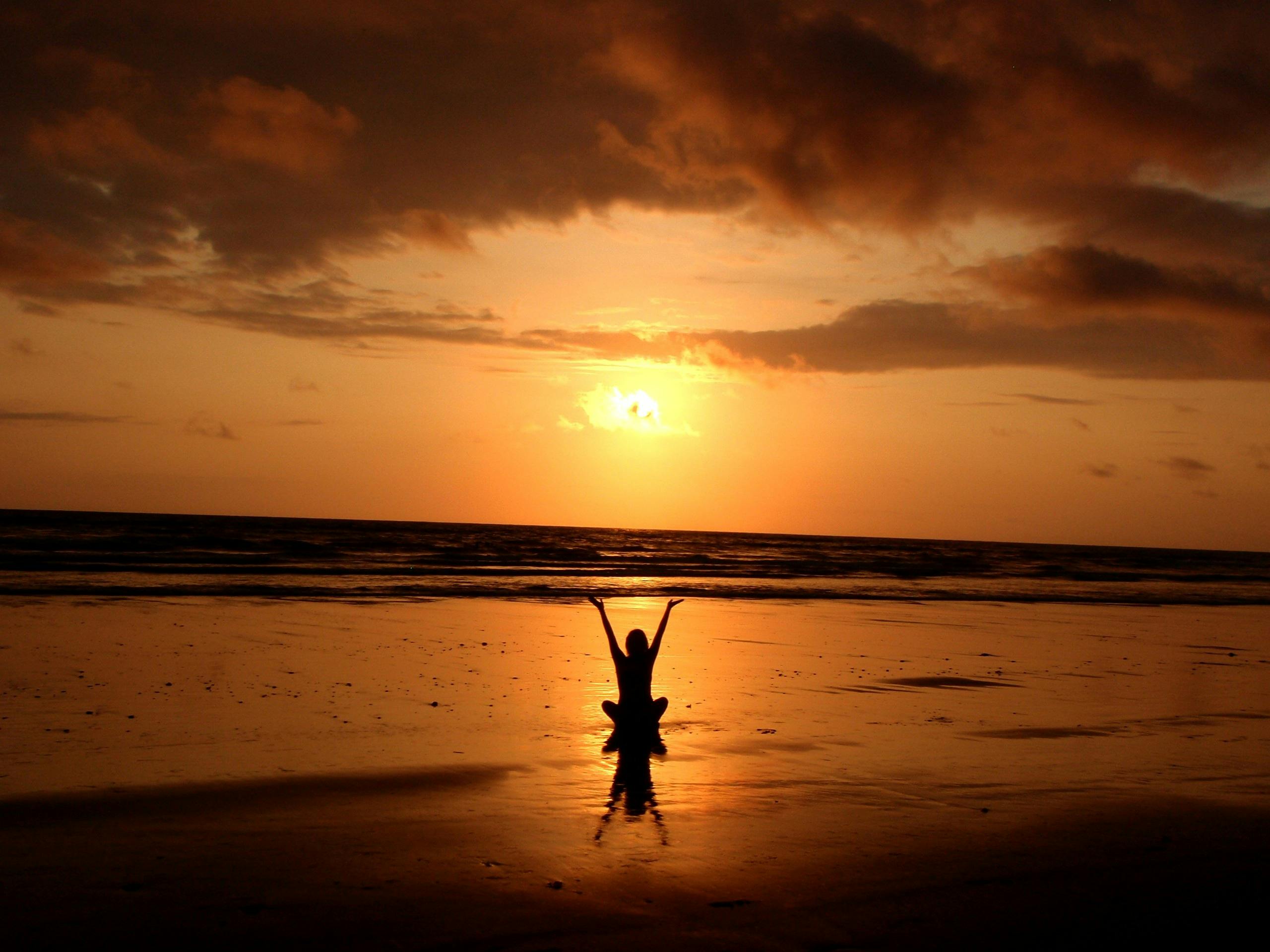
Lighting the 2024 Olympic Flame
Last summer, we embarked on a journey to the ancient temple of Hera in Olympia, Greece, a place steeped in history and tradition. Little did I know that this trip would not only enlighten me about the origin of the Olympic Games but also inspire me in ways I never imagined.
As I stood in the shadow of the 2,600-year-old temple, I couldn’t help but feel a sense of awe and reverence. This was the birthplace of the original Olympic Games, where athletes from all corners of the ancient world gathered to compete in the spirit of peace and unity. It was here that the flame, a symbol of purity and the divine, was lit to signal the start of the Games.

But what struck me most was the ritual of lighting the Olympic flame, a tradition that has endured for centuries. I learned that the flame is ignited using a parabolic mirror to focus the sun’s rays, a process that symbolizes the passing of the Olympic spirit from ancient to modern times. It is a powerful reminder of the enduring legacy of the Games and the ideals they represent.
Visiting Olympia showed me the importance of exploring the world around us. It is through travel that we gain a deeper understanding of history, culture, and ourselves. We learn that the world is vast and diverse, yet interconnected in ways we never imagined. We discover that our actions, like the lighting of the Olympic flame, can inspire others and ignite positive change.
As I reflect on my journey to Olympia, I am reminded of the words of Pierre de Coubertin, the founder of the modern Olympic Games: “The important thing in life is not the triumph but the struggle, the essential thing is not to have conquered but to have fought well.” The lighting of the Olympic flame symbolizes this struggle, this journey of self-discovery and perseverance.

The Paris 2024 Summer Olympic Games
Once the flame is lit, it will not be extinguished until the closing ceremony in Paris. The sacred flame will be handed to the first torchbearer – an Olympic rowing champion. Then it will pass onto 600 other torchbearers and travel through 41 municipalities in Greece, over 5,000 km (3,000 miles). On April 26th the flame will be handed over to the Paris organizers, where 10,000 torchbearers will carry it to 64 French territories. The 12,000 km (7,500 miles) journey will cover over 400 towns before arriving in Paris for the start of the games in July.
I invite you to embark on your own journey of discovery, to explore the world with an open heart and mind. You never know what you may find or how it may inspire you. And as you do, remember the flame that burns within you, a beacon of hope, courage, and determination.
History of the Olympic Games
- 776 BC: The first recorded Olympic Games are held in Olympia, Greece, dedicated to the Greek god Zeus.
- 5th century BC: The Games are held every four years, known as the Olympiad, and become part of the Panhellenic Games.
- 393 AD: The Roman Emperor Theodosius I bans the Olympic Games, ending its ancient era.
- 1894: The International Olympic Committee (IOC) is founded by Pierre de Coubertin, with the aim of reviving the Olympic Games.
- 1896: The first modern Olympic Games are held in Athens, Greece, featuring 280 athletes from 13 nations, competing in 43 events.
- 1900: The second modern Olympic Games are held in Paris, France, featuring over 1,000 athletes from 24 nations, competing in 95 events.
- 1904: The third modern Olympic Games are held in St. Louis, USA, featuring 651 athletes from 12 nations, competing in 91 events.
- 1908: The fourth modern Olympic Games are held in London, UK, featuring 2,008 athletes from 22 nations, competing in 110 events.
- 1916, 1940, 1944: The Olympic Games are canceled due to World Wars I and II.
- 1920: The Antwerp, Belgium, Olympic Games feature 2,626 athletes from 29 nations, competing in 154 events.
- 1924: The Paris, France, Olympic Games feature 3,089 athletes from 44 nations, competing in 126 events.
- 1928: The Amsterdam, Netherlands, Olympic Games feature 2,883 athletes from 46 nations, competing in 109 events.
- 1932: The Los Angeles, USA, Olympic Games feature 1,332 athletes from 37 nations, competing in 116 events.
- 1936: The Berlin, Germany, Olympic Games feature 3,963 athletes from 49 nations, competing in 129 events.
- 1948: The London, UK, Olympic Games feature 4,104 athletes from 59 nations, competing in 136 events.
- 1952: The Helsinki, Finland, Olympic Games feature 4,955 athletes from 69 nations, competing in 149 events.
- 1956: The Melbourne, Australia, Olympic Games feature 3,314 athletes from 72 nations, competing in 145 events. The equestrian events are held in Stockholm, Sweden, due to strict quarantine regulations in Australia.
- 1960: The Rome, Italy, Olympic Games feature 5,338 athletes from 83 nations, competing in 150 events.
- 1964: The Tokyo, Japan, Olympic Games feature 5,151 athletes from 93 nations, competing in 163 events.
- 1968: The Mexico City, Mexico, Olympic Games feature 5,530 athletes from 112 nations, competing in 172 events.
- 1972: The Munich, West Germany, Olympic Games feature 7,134 athletes from 121 nations, competing in 195 events.
- 1976: The Montreal, Canada, Olympic Games feature 6,084 athletes from 92 nations, competing in 198 events.
- 1980: The Moscow, Soviet Union, Olympic Games feature 5,179 athletes from 80 nations, competing in 203 events. The USA and some other countries boycott the Games due to the Soviet invasion of Afghanistan.
- 1984: The Los Angeles, USA, Olympic Games feature 6,829 athletes from 140 nations, competing in 221 events. The Soviet Union and some other countries boycott the Games in retaliation for the 1980 boycott.
- 1988: The Seoul, South Korea, Olympic Games feature 8,391 athletes from 160 nations, competing in 237 events.
- 1992: The Barcelona, Spain, Olympic Games feature 9,356 athletes from 169 nations, competing in 257 events.
- 1996: The Atlanta, USA, Olympic Games feature 10,318 athletes from 197 nations, competing in 271 events.
- 2000: The Sydney, Australia, Olympic Games feature 10,651 athletes from 199 nations, competing in 300 events.
- 2004: The Athens, Greece, Olympic Games feature 10,625 athletes from 201 nations, competing in 301 events.
- 2008: The Beijing, China, Olympic Games feature 10,942 athletes from 204 nations, competing in 302 events.
- 2012: The London, UK, Olympic Games feature 10,568 athletes from 204 nations, competing in 302 events.
- 2016: The Rio de Janeiro, Brazil, Olympic Games feature 11,238 athletes from 207 nations, competing in 306 events.
- 2020/2021: The Tokyo, Japan, Olympic Games feature 11,656 athletes from 205 nations, competing in 339 events, postponed to 2021 due to the COVID-19 pandemic.





